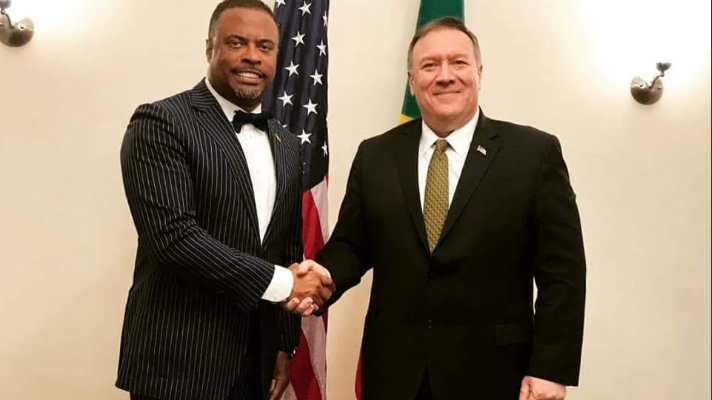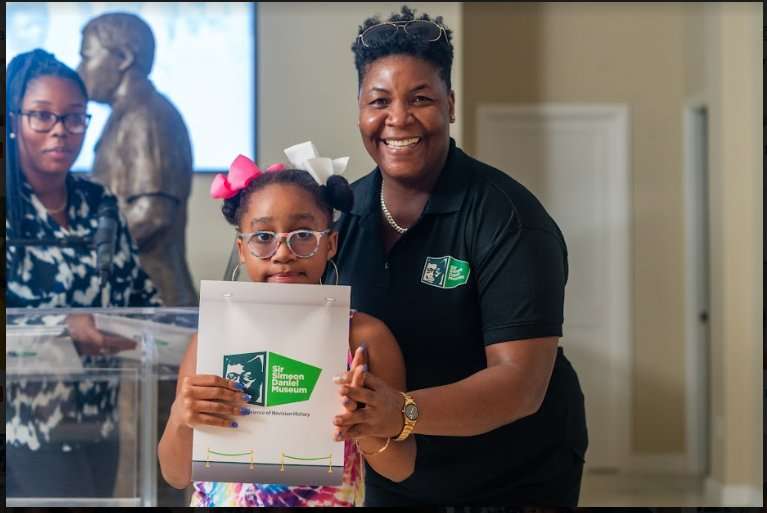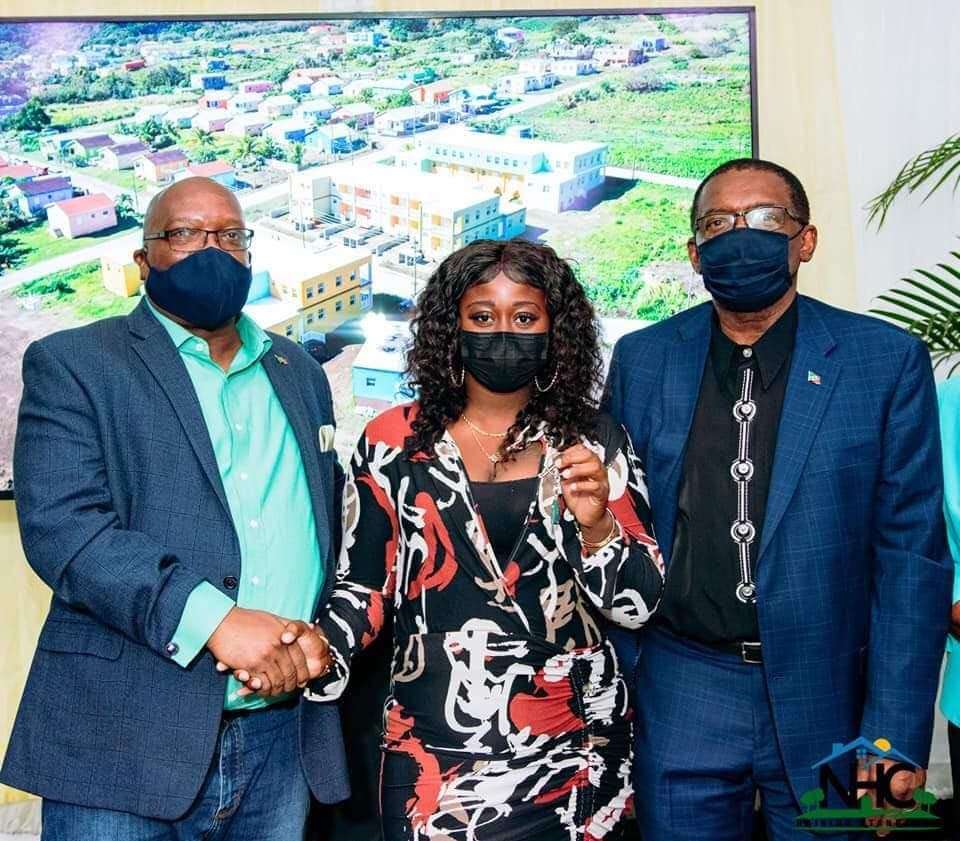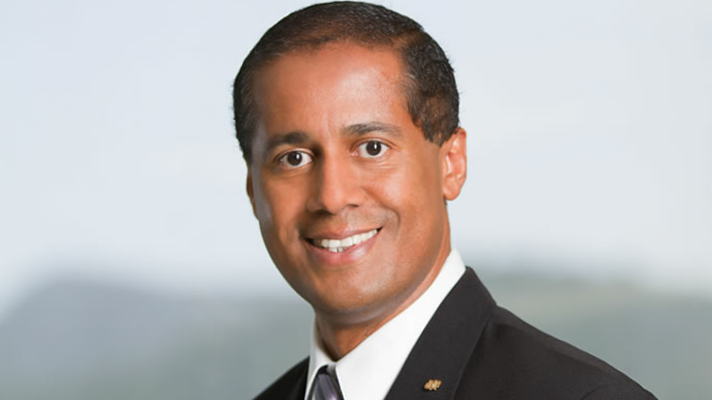
NIA CHARLESTOWN NEVIS (January 22, 2020) — The following is the full text of comments made by Hon. Mark Brantley, Minister of Foreign Affairs in St. Kitts and Nevis, at a round table discussion with United States Secretary of State Mr. Mike Pompeo and other Caribbean officials, at The Jamaica Pegasus Hotel in New Kingston on January 22, 2020.
Good morning everyone,
Thank you very much my sister Camille for this invitation. I feel like I am home and Secretary Pompeo as an honorary Jamaican, welcome to Jamaica. Welcome to the Caribbean. We are absolutely delighted to have you and thank you very much for the invitation.
I, as you know I’m the Foreign Minister of St. Kitts and Nevis. I remind my colleagues all the time that we are the smallest nation in the hemisphere, and I suppose it’s the power of multilateralism that I’m allowed the opportunity to sit at the same table as some of the larger colleagues and certainly the great United States.
I do however, have one point that I believe distinguishes me and my country and that is your founding father Alexander Hamilton was born in Nevis. I like to remind them that we contributed significantly to the founding of the great United States.
Mr. Secretary, I believe that we are naturally in a difficult period in our region, and one of the concerns certainly that we have had in our region is this ongoing issue of de-risking and that is a phenomenon where many of our correspondent banking relationships, mostly United States based banks are withdrawing from the region, seeing the region as high risk and as a consequence, leading to a phenomenon of de-risking as we are calling it.
We think that this is a grave and present danger to our economies, that for example the cruise industry which is largely dominated by US players is at risk if the Caribbean region is not able to do banking.
The difficulties of course would mean that with this continued phenomenon if it is not arrested, that our people and our region would be cut off from the international banking sector which really would result in our inability to trade, in our inability to pay for goods and services.
One of the difficulties we’ve had is of course, that a lot of these matters such as de-risking, its attendant consequences, blacklisting are largely handled through the Treasury and we recognise that we are obviously in the presence of the Secretary of State.
That has been a concern in terms of – Hamilton had the other gift. I wish he was around today I think he would be very helpful – but one of the concerns of course Excellency, is the ability to influence what clearly is a private sector initiative and we think that largely comes from the sense, that the Caribbean is a high risk area for business.
We are as in what has been said, the third boarder to the United States. We think that we are definitely within the zone of the Americas that is clearly relevant and critical. The fact that we are here today having this conversation is demonstrative of the commitment to that relationship, and we really would like to see a greater interest of the Unites States to this particular problem that we are experiencing.
We think that this blacklisting phenomenon which then leads to this reputational damage which in turn leads to the threat of de-risking, runs the real risk for us of derailing any economic gains that we would have made.
I think when our economies are derailed and the consequences are what my brother from Belize have described, we see mass migration because there is less and less reason for people to stay at home. There is no opportunity for them to make it and to survive at home, and so we would want to draw this to your attention and to invite certainly, the State Department to engage with us in a more active way, and perhaps speak to Hamilton’s successors at Treasury to try and assist in that regard.
I would also want, since I’m there, to talk about the issue of graduation. All of us around this table with the exception of very few are now being told by international agencies that we have graduated. Many of us feel that we aught still to be in primary school but we’ve been told no we’ve graduated, and the difficulty that that poses Mr. Secretary, is that we are therefore cut off from accessing certain concessional lending, certain loans and financial instruments that we need for our development.
One of the issues that we in the region have advocated quite strongly on, is that there be some amelioration of the current sterile mechanism that is employed for assessing our status as middle income or high income countries as the case may be.
We take Bahamas for example, which has long enjoyed a tradition of being one of the higher income countries of the region, and therefore ineligible for overseas developmental assistance.
One storm, Dorian, swept through the Bahamas and what was perhaps a high income area in the Bahamas, Abaco and those islands were decimated.
We have seen what Hurricanes Maria and Irma have done in Dominica, in Antigua and the rest of the region as well. I say that to say that in our region we are just one storm, one catastrophe away from disaster in most cases. We do not have the landmass where we can say that we are moving to a safe zone.
For many of us when a storm comes it decimates one country, maybe two countries maybe sometimes a whole swath of our region, and so we feel that the international community has not responded in a positive way, and by continuing this sterile measure GDP per capita, it ignores the reality that we are in, an extremely vulnerable position where our gains can be wiped out sometimes in the space of hours in wind and rain.
Haiti, my colleagues are here. They’ve had earthquakes, they’ve had other catastrophes that have set them back considerably, and I think this is an area we would really like to see some intervention at the highest levels.
We have advocated for a vulnerability index to be part of that analysis, so that the Caribbean region is not locked out of developmental assistance and international aid.
That is an important point Mr. Secretary because it leads to what I have called a debt trap for many of us because as we seek to rebuild after disasters. Often times we are forced to go to the market to borrow often times at commercial rates which pancakes on to our debt, leading then to an over burden of debt which in turn, results in us using most of our budgets to service debt instead of providing the essential services such as education, health etc. to our people.
So this for us is a very important issue. It is one that I would urge your government to take a look at. It is something I think that would be beneficial to us in helping us to build our own resilience and our own capacity to respond, and certainly we feel that this would augur well if we can address those issues and to do so collectively.
I end Mr. Secretary, by thanking you personally for the invitation, by thanking the United States for its friendship over the years, by saying that because of Hamilton and our contribution we expect a kinder gentle relationship with the United States of America.
You aught never to forget your roots which are clearly firmly embedded in my island of Nevis, and as a consequence, we think that there is much scope for us to work together and to corporate. The United States, despite what I’ve heard of the hills and valleys, the ups and downs remains our best friend, and we must continue I think to burnish that relationship.
Thank you again for that opportunity.
END








